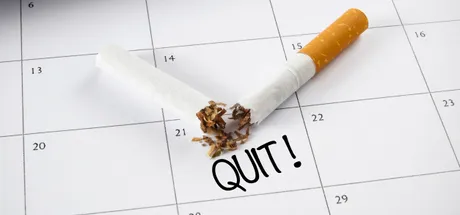Contraindications
NiQuitin Minis 4mg Lozenges are contraindicated in:
- Hypersensitivity to nicotine or any of the excipients.
- Children under the age of 12 years.
- Non-smokers.
Special warnings and precautions for use
The risks associated with the use of nicotine replacement therapy (NRT) are substantially outweighed in virtually all circumstances by the well-established dangers of continued smoking.
If you have any of the following conditions, initiation of NiQuitin Minis Lozenges should only be under medical supervision, or you should consult a healthcare professional:
- Recent myocardial infarction, severe cardiac arrhythmias, unstable or worsening angina including Prinzmetal's angina, uncontrolled hypertension or recent cerebrovascular accident.
- Diabetes Mellitus: Monitor blood glucose levels closely as they may be more variable when stopping smoking.
- Allergic reactions: Susceptibility to angioedema and urticaria.
- Renal and hepatic impairment: Use with caution as nicotine clearance may be decreased.
- Phaeochromocytoma and uncontrolled hyperthyroidism: Use with caution as nicotine causes release of catecholamines.
- Gastrointestinal Disease: Swallowing nicotine may exacerbate symptoms in persons suffering from active oesophagitis, oral or pharyngeal inflammation, gastritis, gastric ulcer or peptic ulcer.
- Seizures: Use with caution if taking anti-convulsant therapy or with a history of epilepsy.
Danger in small children:
Doses of nicotine tolerated by adult and adolescent smokers can produce severe toxicity in small children that may be fatal. Products containing nicotine should not be left where they may be misused, handled or ingested by children.
Pregnancy and Lactation
Smoking during pregnancy is associated with significant health risks for both mother and baby. Ideally, smoking cessation during pregnancy should be achieved without NRT. However, for women unable to quit on their own, NRT may be recommended by a healthcare professional to assist a quit attempt. The risk of using NRT to the fetus is lower than that expected with tobacco smoking.
As nicotine passes to the fetus and into breast milk, the decision to use NRT should be made as early in pregnancy as possible, aiming for use for only 2-3 months. Intermittent dosing products like lozenges may be preferable to patches as they typically provide a lower daily dose of nicotine.
Undesirable effects
NRT can cause adverse reactions similar to those associated with nicotine administered in other ways. Common symptoms related to withdrawal from smoking may include headache, dizziness, sleep disturbance, and increased coughing. NiQuitin Minis 4mg Lozenges at recommended doses have not been found to cause serious adverse effects.
Very Common (≥1/10): Nausea, Pharyngitis.
Common (≥1/100 to <1/10): Insomnia, anxiety, irritability, increased appetite, anger, aggravated anxiety, headache, dizziness, vomiting, dyspepsia, heartburn, indigestion, hiccup, mouth irritation, mouth ulceration, tongue ulceration, diarrhoea, belching, flatulence, dry mouth, constipation, coughing, vascular disorder, flushing, skin flushed.
For a full list of adverse reactions, please refer to the Patient Information Leaflet.
Overdose
Symptoms of an overdose from nicotine lozenges include pallor, cold sweat, salivation, nausea, vomiting, abdominal pain, diarrhoea, headache, dizziness, disturbed hearing and vision, tremor, mental confusion and weakness. Seek medical attention immediately if an overdose is suspected.






